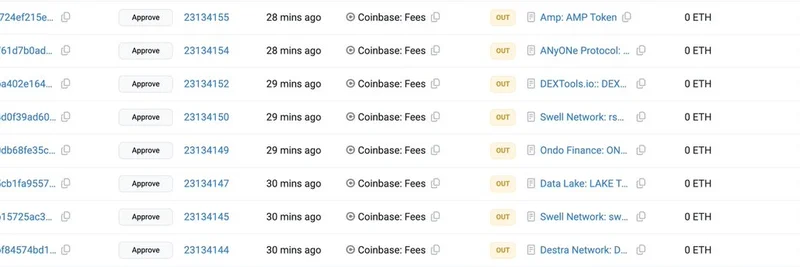In the fast-paced world of cryptocurrency, even giants like Coinbase aren't immune to costly mistakes. A recent incident highlighted by security researcher @deeberiroz on X (formerly Twitter) reveals how Coinbase lost around $300,000 due to a mishandling of token approvals with the 0x Project swapper. This event underscores the importance of secure practices, especially for those trading meme tokens where quick swaps and fee accruals are common.
The thread started with @deeberiroz pointing out that Coinbase had approved all tokens accumulated as fees to their router via the 0x swapper—a tool not designed for such approvals. This oversight allowed MEV (Miner Extractable Value) bots to swoop in and drain the funds almost immediately. MEV bots are automated programs that scan the blockchain for profitable opportunities, often exploiting inefficiencies or errors like this one.
As explained in the thread, the 0x swapper has been known for issues, such as those with Zora claims on Base, where it enables arbitrary calls that can lead to vulnerabilities. In this case, an MEV bot had been lying in wait, ready to pounce on any mistaken approvals to this contract. Coinbase's fee receiver account, which collects small amounts from various transactions—including potentially those involving popular meme tokens—became the target.
The drain involved multiple tokens, including AMP Token, MyOne Protocol, DEXTools.io, Swell Network, Onda Finance, Data Lake, and Destor Network. Each approval was followed by a swift transfer out, with zero ETH involved but small token amounts adding up to the significant loss. For meme token traders, this is a stark reminder: fees from high-volume trades can accumulate valuable assets, making them prime targets if not handled securely.
Coinbase's Chief Security Officer, @SecurityGuyPhil, responded promptly, confirming it was an isolated issue stemming from a change in one of their corporate DEX wallets. Importantly, no customer funds were affected. The team revoked token allowances and migrated funds to a new wallet. This quick action, aided by the security community, mitigated further damage.
The incident lasted about five hours before resolution, as noted by @FiliusJff, who offered support from their protocol experienced in MEV-safe code. Discussions in the replies touched on broader solutions like encrypted mempools, though @deeberiroz clarified that this wasn't a sandwich attack but a direct approval exploit.
For blockchain practitioners and meme token enthusiasts, key lessons emerge:
Understand Tool Limitations: The 0x swapper isn't meant for approvals. Always double-check documentation and best practices when integrating DEX routers.
Monitor Approvals: Use tools like Revoke.cash to manage and revoke unnecessary token approvals regularly.
MEV Awareness: In the meme token space, where hype drives rapid trading, MEV bots are ever-present. Opt for protocols with built-in protections against such exploits.
Corporate Vigilance: Even established players like Coinbase can err, so individual traders should prioritize security audits and simulations.
This event, while costly for Coinbase, serves as valuable education for the community. By staying informed about such incidents, meme token holders can better safeguard their assets in this volatile ecosystem. For more insights on crypto security and meme token trends, keep exploring Meme Insider.


